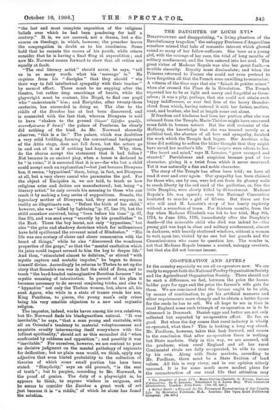1.1:11/ DAUGHTER OF LOUIS XVL* DI6A.PPOINTND and disappointing, "a living
phantom of the Revolutionary tragedies," the unhappy Duchess's d'Angouleme somehow missed that halo of romantic interest which glowed round so many of her fellow-sufferers. She bore as a young girl, with the courage of her race, the trial of long months of solitary confinement, and the iron entered into her soul. The great virtue of Madame Royale was also her great fault,—a terrible sincerity. Royalty must dissimulate ; and when the Princess returned to France she could not even pretend to have forgotten all that the French were unwilling to remember. A witness of the time says that she " faisait de petites mines" when she crossed the Place de la Revolution. The French expected her to be as light and merry and forgetful as them- selves ; it was a pity, perhaps, that she could not attain such happy indifference, or ever feel free of the heavy thunder- cloud from which, having entered it with her father, mother, aunt, and brother, she had at length come out alone.
If freedom and kindness had been her portion after she was released from the Temple, Marie-Therese might have recovered some faith in human nature. But the stiff restraint of the Hofburg, the knowledge that she was treated merely as a political tool, the absence of all love and sympathy, finished the work which the Temple had begun. Her Austrian rela- tions did nothing to soften the bitter thought that they might have saved her mother's life. The emigres were odious to her. "Her heart and mind," says M. Leuotre, "grew cramped and stunted." Peevishness and suspicion became part of her character, giving it a twist from which it never recovered. Yet it was naturally a fine and noble character.
The story of the Temple has often been told; we have all read it over and over again. Our sympathy has been claimed for those who, one by one, were led out from its gloomy walls to reach liberty by the red road of the guillotine, or, like the little Dauphin, were slowly killed by ill-treatment. Madame Royale's life was spared ; even the National Convention hesitated to murder a girl of fifteen. But there are few who will read M. Lenotre's story of her lonely captivity without a sensation of tears. For thirteen months, from the day when Madame Elisabeth was led to her trial, May 9th, 1794, to June 13th, 1795, immediately after the Dauphin's death—if the miserable child who died was indeed he—this young girl was kept in close and solitary confinement, almost in darkness, with heavily shuttered windows, without a woman to wait upon her, visited by no one but her guards and the Commissioners who came to question her. The wonder is, not that Madame Royale became a soured, unhappy creature, but that she did not become insane.














































 Previous page
Previous page